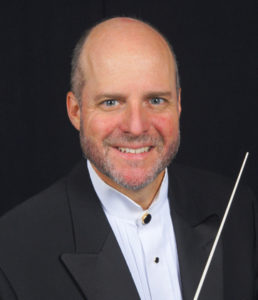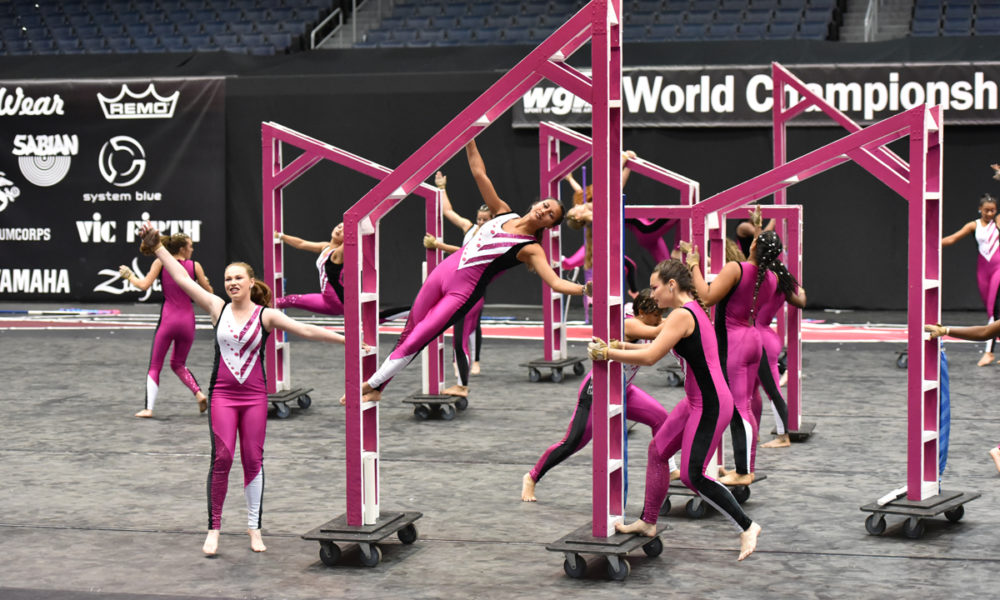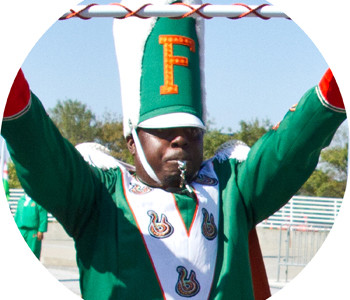 Together, the band students and staff of Marjory Stoneman Douglas High School has worked to overcome the trauma of the 2018 school shooting by creating community and healing through excellence in music.
Together, the band students and staff of Marjory Stoneman Douglas High School has worked to overcome the trauma of the 2018 school shooting by creating community and healing through excellence in music.
Despite a difficult year following the mass shooting on Feb. 14, 2018, the bands at Marjory Stoneman Douglas High School in Parkland, Florida, continues to shine. Director of Bands Alex Kaminsky reflects on how the band program has pushed on and thrived as he leaves the school for a new position at VanderCook College of Music in Chicago.
Halftime: What is your musical background?
Kaminsky: I did my [Bachelor of Arts] in music education at the University of Florida, then went straight to grad school at Indiana University, where I got my master’s in music performance, then started teaching in 1989. Stoneman Douglas is my fifth and final public high school before I “retire.” I was [recently] offered the position of director of bands at VanderCook College of Music in Chicago, not only training students to play but also training the next generation of band directors on how to teach the craft.
Halftime: Tell us about some of the marks of success at Stoneman Douglas.
Kaminsky: I’ve been here for four years, and every year has been award winning. … The marching band is sitting at two consecutive state championships, the first [time] in the history of the school. … This is also the first time the school had two of its concert bands earn superiors from every judge at state level.
Our guard program is very strong. We have three guards, and all have won awards. Our World [Class] guard has finished in the top five on the national level during my tenure.
Our wind symphony was invited to perform at the New York Wind Band Festival at Carnegie Hall last year. This past year in December, we performed at The Midwest Clinic International Band and Orchestra Conference. This is my fourth band that I’ve taken to The Midwest Clinic. I have been very blessed that I’ve been able to obtain that level with my students.
Halftime: How have the students and staff pushed on and continued their success following the shooting?
Kaminsky: They have been a motivator and encourager; their performances are at a very high level for teenagers, and when they perform, they have a profound impact on those that are listening. … Music is very powerful when it’s performed at a high level; it touches people profoundly. These kids have been basically speaking and expressing themselves through their music; the emotions they’ve been experiencing have been evident in the emotion that you hear in their music.
Halftime: How have the students and staff worked together to recover emotionally?
Kaminsky: I, as the leader, have done my best to keep them focused on music making, and when they immerse themselves in their craft, it’s difficult to focus on the negative things happening around us. … When you create music with other people, there’s a sense of community, and because of the tragedy we all experienced, it has unified us more than ever before.
Halftime: How has the music program honored those who were lost?
Kaminsky: There’s always the looming sad fact that we lost a musician and a guard member in the tragedy, and that’s in the back of our minds, but the way we’ve overcome that was to dedicate our performances to them in their honor. That has also perpetuated the level of excellence because we want to make sure we honor them correctly, so we’re going to play our hearts out for those friends that we lost.
Halftime: Does the program have any special traditions?
Kaminsky: There’s a song we sing before we take the field at any competition called “Invincible” [by Muse]. The band’s been singing that for a long time, and it’s never been so meaningful as it is now.
Halftime: What is one of your proudest moments with the band?
Kaminsky: [One of them] would have to be our performance at Carnegie, which was just three weeks after the tragedy. [It] was one of the most emotion-filled performances I’ve ever experienced with high school students to the point where there were tears on the faces of not just students and myself but also the audience.
Halftime: What is your advice for other directors, especially those going through difficult challenges?
Kaminsky: Be there for your kids. Try to avoid dwelling on the negative and move them forward by focusing on music. It’s an incredible form of therapy that is very powerful and will help them move forward from anything they’ve encountered.
Halftime: What is your advice for marching musicians?
Kaminsky: Know that it’s become more a physical, athletic activity and that it will not always be easy—it will be a lot of hard work. But the payoff and the benefits that you get out of it, not only at a musical level but also on an emotional and social level, far outweigh the work that it takes to be outstanding.


